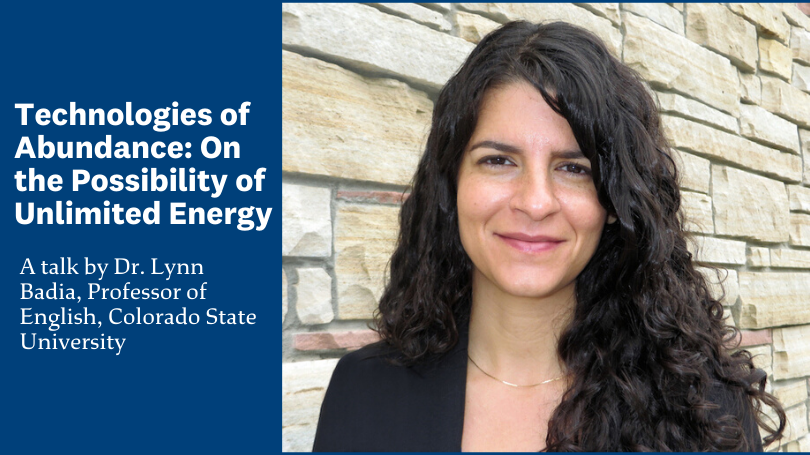
- About
- Education
- Research
- Engagement & Collaboration
- News & Events
Back to Top Nav
Back to Top Nav
Back to Top Nav
Back to Top Nav
Professor Lynn Badia, "Technologies of Abundance: On the Possibility of Unlimited Energy"
February 25, 2020
One late afternoon in February, Dr. Lynn Badia spoke to a wide-ranging group of Dartmouth and local community members about the idea of unlimited energy and imagining a world with free energy. Now an Assistant English Professor in Colorado State University, Badia has, throughout her career, investigated the intersection between the sciences and the humanities, especially when considering our energy future.
Throughout her talk, Dr. Badia emphasized that discussions about energy should be understood as a historical object. Only when contextualized can we discuss energy with a truly critical eye, particularly when considering the implications of free and unlimited energy.
Dr. Badia pinpointed the early 19th century as the beginning of the free energy narrative. This period marked an energy intensification as an abundance of fossil fuels came online and as the law of thermodynamics was developed.
According to Dr. Badia, as energy became a more sophisticated concept, free energy narratives started to spring up. Various thinkers began to imagine utopian communities, with abundant energy improving social life in huge ways. Some people, like Henry David Thoreau, were more critical of the idea of free energy, stating that organizing a society around free energy, through problematic management of nature, actually obscures social vision and the imagining of new forms of social life.
This discourse can be contrasted by the present day. Badia moved to a slide with various advertisements from fusion energy companies. Nuclear fusion, if further developed and commercialized, would become the most energy dense form of power ever, hinting at the free, limitless energy discourse from the 19th century.
Badia pointed out that commercials describing fusion energy often include words similar to "inexhaustible," "environmentally benign," and "universally available resource" to create an abundant, yet harmless tone around this new form of energy. These words frame free energy as energy without politics. Another advertisement used the following slogan: "Clean Energy. Everywhere. Forever."
However, just as Thoreau suspected, Badia told us that abundance does not mean abundance for everyone. For example, Badia pointed out that the US created food abundance a century ago during the Green Revolution, but has the US created food abundance around the world? On the contrary, famine and food insecurity remain prevalent. Badia makes the claim that without a historical and contextualized conversation about energy—a collaboration between the sciences and the humanities—the same issues in resource allocation and environmental degradation will perpetuate, but with energy as the resource. Badia referenced the fusion energy advertisements, stating that these companies rarely discuss the consequences of free energy on society and the environment. In reality, these companies will most likely develop their technologies in countries that have the means to do so, furthering the gap in resources between developed and developing countries.
According to Badia, energy discourse must be contextualized and critiqued. Historically, energy abundance and intensity has always been connected to human wellbeing in energy discussions, and Badia called for us to be more critical of this discourse given that, historically, resource abundance without critique has only led to an increasing inequality.
The talk was sponsored by sponsored by the Arthur L. Irving Institute for Energy and Society, the Revers Center for Energy at the Tuck School of Business, and the Dartmouth College Office of the Associate Dean for the Arts and Humanities, the Leslie Center for the Humanities, and Environmental Humanities.
Jenn Chen '23 is a communications intern for the Irving Institute.